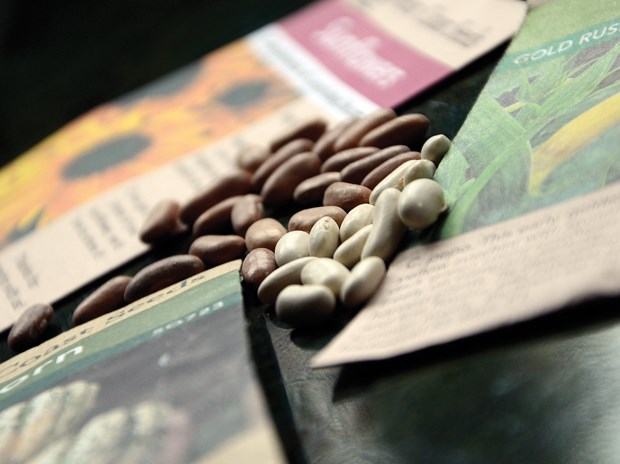For gardeners who grow plants from seed, the start of January is about planning and ordering.
Seed sowing is among the most ancient of horticultural techniques, spanning back thousands of years to our agrarian roots.
If you care about the choices you make when purchasing plants and seeds, the provenance and purity of the seed matters. For those of us who are concerned about preserving a million years of evolved genetic heritage that is found in all seeds, buying seeds is not as easy as it was before the age of genetic manipulation.
Genetically modified organisms, or GMOs, are plants or animals that have had their DNA or RNA spliced, augmented or modified in a laboratory through
the addition of foreign DNA or RNA, sometimes from an organism that is genetically across nature's species boundary to produce a supposed improved version.
An example of the species boundary is a cat and a fish - two genetically different species - or in plants, a corn plant and a pine tree.
There is significant concern among farmers, horticulturalists, seed savers and botanists who are not on the payroll of big-agri companies that GMOs have not been fully tested to assure there are no negative effects for people or the environment when GMOs are released.
A case in point: genetic drift, which you will have to look up if you care.
The GMO issue is further compounded by the absence of GMO product labelling laws because investment and jobs seem more important than people's right of choice. A good place to learn about GMOs is at the nongmoproject.org website.
In contrast to GMO seeds, open-pollinated seeds are pollinated by natural forces such as wind, water, insects, birds, animals or self-pollination. Open-pollinated seeds produce the widest genetic diversity and yield plants adapted to the natural world. GMOs or Franken-seeds produced in laboratories have not been tested through a million years of timetrialing to adapt and harmonize with the natural world. Franken-seeds can however be patented for profit.
With those thoughts in mind, here is a list of seed suppliers that believe in preserving the genetic diversity of plants and seeds, growing organically and sustainably. They have taken the Safe Seed Pledge, selling seeds that are open-pollinated and not genetically engineered.
Information about the Safe Seed Pledge can be found at highmowingseeds. com.
Close to home is saltspringseeds.com on Salt Spring Island, which promotes safe and sustainable local agriculture. They specialize in heritage and heirloom open-pollinated and non-GMO seed varieties of vegetables and plants.
The next seed supplier is a fixture in the local seed business, westcoastseeds.com. They sell a wide range of mostly organic and untreated seeds of veggies, herbs and ornamental plants.
Farther from home is seedsnow.com, which is a family-owned business outside of Los Angeles, providing 100 per cent non-GMO, open-pollinated seeds. They claim: "First and foremost, we do not buy or grow any seed from large corporations that make genetically engineered seeds. We only work with growers who share the same stance against genetically modified foods as we do. Not a single one of the seeds offered on our website are from Monsanto, Seminis, or any other company affiliated with genetically engineered seeds."
Seeds Now sells veggies and herbs.
From Eastern Canada in Nova Scotia there's a small company with a big heart called Hope Seed (hopeseed.com), whose owner and head grower Andrea Berry has a passion for seed saving. Berry says on her website, "We just don't really know where this climate change deal will take us, but growing and breeding plant varieties out of the wide genetic base of heritage varieties to regional variations of soil, weather patterns and cultural methods is an essential tool for food security."
Hope Seeds sells heirloom and rare varieties of veggies, herbs and some flowers.
On Vancouver Island is seedsofvictoria.com, which states that, "Agriculture and seeds provide the basis upon which our lives depend. The mechanical transfer of genetic material outside of natural reproductive methods and between genera, families or kingdoms poses great biological risks, as well as economic, political and cultural threats."
I could not have said it better myself, which is why supporting such a company is good for all of us.
Seeds of Victoria sells veggies, herbs and flowers.
Three other seed sources worth mentioning include Richters Herbs in Ontario (richters.com), which sells a wide variety of herbs.
Heritage Harvest Seed from Manitoba sells vegetables, herbs and flowers. And Victory Seeds from Oregon sells vegetable, grain, flower and herb seeds.
Over the last two decades, big-agri businesses like Monsanto and others have been quietly buying up seed compAnies to consolidate their market share, which means a seed may no longer be just a seed, it could be a Frankenseed, so choose your seed supplier carefully.
Todd Major is a journeyman horticulturist, garden designer and builder, teacher and organic advocate. For advice contact him at [email protected].



